
Future of Food-Journal on Food Agriculture and Society
Scope & Guideline
Uncovering Pathways to Sustainable Agriculture Practices
Introduction
Aims and Scopes
- Sustainable Agriculture Practices:
Research focused on sustainable agricultural methods, including organic farming, precision agriculture, and agroecology, aimed at enhancing productivity while minimizing environmental impact. - Food Security and Nutrition:
Investigations into food security challenges, nutritional adequacy, and the socio-economic factors affecting access to food, particularly in vulnerable populations and regions. - Food Systems and Consumer Behavior:
Studies exploring consumer preferences, food choices, and behaviors, including the impact of social factors and marketing strategies on food consumption patterns. - Innovative Food Technologies:
Research on the development and application of new food technologies, such as alternative protein sources, food preservation methods, and bioengineering in agriculture. - Cultural and Socioeconomic Aspects of Food:
Examinations of how cultural practices, traditions, and socioeconomic conditions influence food production, consumption, and dietary habits. - Climate Change and Its Impact on Food Systems:
Analysis of how climate change affects agricultural productivity, food security, and strategies for climate-smart agriculture.
Trending and Emerging
- Plant-Based Diets and Alternative Proteins:
There is a significant increase in research on plant-based diets and alternative protein sources, reflecting a growing consumer demand for sustainable and health-conscious food options. - Technology in Agriculture:
Emerging studies focus on the integration of technology in agriculture, such as precision farming and smart agriculture, which are seen as crucial for enhancing productivity and sustainability. - Impact of Climate Change on Food Systems:
An increasing number of papers address the effects of climate change on agricultural practices and food security, emphasizing the need for adaptive strategies in food systems. - Empowerment and Gender in Agriculture:
Research on the role of women in agriculture and agripreneurship is gaining traction, highlighting the importance of gender equity in achieving sustainable food systems. - Food Innovation and Consumer Acceptance:
There is a growing interest in the acceptance of novel food products and innovations, including functional foods and biofortified crops, as consumers seek healthier and more sustainable options.
Declining or Waning
- Traditional Agricultural Practices:
Research focusing on conventional farming methods is less prevalent, possibly due to a growing emphasis on sustainable and innovative agricultural practices that respond to modern challenges. - Animal Agriculture:
There appears to be a waning interest in studies centered on traditional animal agriculture, likely due to increasing focus on plant-based diets and alternative protein sources in response to environmental concerns. - Food Waste Management:
Although still relevant, the frequency of studies specifically addressing food waste management techniques has decreased, possibly overshadowed by broader sustainability narratives. - Local Food Systems:
Investigations into localized food systems and their benefits have seen a decline, as more attention shifts towards global food security issues and integrated food supply chains.
Similar Journals
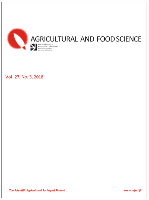
AGRICULTURAL AND FOOD SCIENCE
Exploring the intersection of agriculture and technology.AGRICULTURAL AND FOOD SCIENCE is a prestigious journal published by the SCIENTIFIC AGRICULTURAL SOCIETY OF FINLAND, dedicated to advancing knowledge in the fields of agricultural and food sciences. With an ISSN of 1459-6067 and E-ISSN of 1795-1895, this open-access journal has been providing valuable insights and research findings since its inception in 2002. As of 2023, it holds a Q3 ranking in Food Science and is positioned at the 46th percentile within its Scopus category, ranking 210 out of 389 journals in Agricultural and Biological Sciences – Food Science. The journal features contributions from a global network of researchers, covering various topics including sustainable agricultural practices, food safety, and innovative food technologies. Based in Finland, the journal serves as an essential platform for scholars, professionals, and students who are committed to enhancing food security and agricultural productivity through rigorous scientific research. The convergence of interdisciplinary studies from 2004 to 2024 marks a critical evolution in the scope of agricultural and food research, making this journal a vital resource for anyone involved in these dynamic fields.

Frontiers in Sustainable Food Systems
Transforming agriculture through cutting-edge research.Frontiers in Sustainable Food Systems, published by FRONTIERS MEDIA SA, stands at the forefront of interdisciplinary research in sustainable food practices, agriculture, and global ecological impacts. This open-access journal, launched in 2018, aims to disseminate innovative findings that reshape our understanding of food systems' sustainability and resilience. With a significant impact factor and ranking in the top quartile across various categories such as Agronomy and Crop Science, Ecology, and Food Science, it is positioned as a leading platform for scholars and practitioners alike. The journal’s commitment to addressing the pressing challenges of food security and environmental sustainability ensures its relevance in today’s rapidly evolving landscape. It is a vital resource for researchers, professionals, and students dedicated to advancing sustainable practices in food systems globally.

Poljoprivreda
Advancing agricultural knowledge for a sustainable future.Poljoprivreda is a distinguished open-access journal dedicated to the field of agronomy and crop science, published by the FAC Agriculture Osijek in Croatia. Since its inception in 2000, the journal has been committed to disseminating high-quality research that informs both academic and practical advancements in agriculture. With an ISSN of 1330-7142 and an E-ISSN of 1848-8080, Poljoprivreda provides a vital platform for researchers, professionals, and students to engage with the latest findings and methodologies in agronomy, contributing significantly to the enhancement of agricultural practices in Croatia and beyond. Although currently ranked in the 22nd percentile within its category according to Scopus, the journal aspires to elevate its standing by welcoming innovative research that addresses contemporary challenges within the agricultural sciences. By fostering open access since 2000, Poljoprivreda ensures that its scholarly content is freely available, promoting wider dissemination and collaborative opportunities among researchers globally.
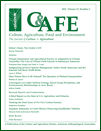
Culture Agriculture Food and Environment
Cultivating Understanding of Food, Culture, and the EnvironmentCulture Agriculture Food and Environment, published by WILEY, is an esteemed journal that serves as a pivotal platform for interdisciplinary research at the intersection of cultural studies, anthropology, and agricultural sciences. With its ISSN 2153-9553 and E-ISSN 2153-9561, this journal aims to foster scholarly dialogue on the complex relationships between food, culture, and environmental sustainability. As of 2023, it proudly holds a Q2 ranking in Agricultural and Biological Sciences and Anthropology, as well as a Q1 ranking in Cultural Studies, indicating its significant impact within these disciplines. Researchers and professionals will appreciate its rigorous peer-review process and diverse coverage, which extends from 2011 to 2024, reflecting ongoing debates and innovations in the field. Although open access options are not provided, the journal's commitment to advancing knowledge in understanding food systems and cultural practices makes it a vital resource for academics and practitioners alike, promoting a deeper understanding of the cultural dimensions of agriculture and the environment.

Food Security
Empowering Dialogue on Food SustainabilityFood Security is a premier academic journal dedicated to advancing knowledge and fostering dialogue surrounding the critical issues of food security and sustainability in a rapidly changing world. Published by Springer, this journal has established itself as a leading voice in the fields of Agronomy, Crop Science, Development, and Food Science, reflected in its impressive Q1 quartile rankings across these disciplines for 2023. With an impact factor showcasing its significant influence, Food Security is ranked in the top echelon of its domain, with notable positions in Scopus indices (Rank #7 in Agronomy and Crop Science, Rank #6 in Development, and Rank #13 in Food Science). Spanning articles from 2010 to 2024, the journal serves as a critical resource for researchers, professionals, and students seeking to address the complex interplay of agricultural practices, socio-economic dynamics, and environmental factors that contribute to food availability and accessibility on a global scale. While primarily subscription-based, Food Security ensures that its audience remains engaged with the latest research, policy discussions, and innovative solutions to combat food insecurity worldwide.
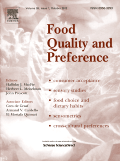
Food Quality and Preference
Elevating Standards in Food Science and Sensory AnalysisFood Quality and Preference is a leading journal in the fields of food science and nutrition, published by ELSEVIER SCI LTD. With a notable impact factor and ranking in the Q1 quartile for both food science and nutrition and dietetics in 2023, this journal consistently publishes high-quality research that explores the multifaceted aspects of food preferences, sensory evaluation, and consumer behavior. The journal provides a critical platform for researchers, professionals, and students engaged in the study of food quality, aiming to enhance our understanding of how sensory properties, nutritional value, and consumer choices intersect. Its commitment to disseminating cutting-edge findings makes it an essential resource for advancing the field and informing practice in both academic and industry settings. Access to the journal is via subscription, allowing for robust engagement with pioneering research that shapes current and future practices in food-related studies.
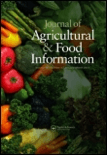
Journal of Agricultural & Food Information
Exploring the Intersection of Agriculture and Information Management.Welcome to the Journal of Agricultural & Food Information, a pivotal platform for disseminating research and insights across the domains of agronomy, food science, and information systems management. Published by Routledge Journals, Taylor & Francis Ltd, this esteemed journal, with an ISSN of 1049-6505 and E-ISSN 1540-4722, plays a crucial role in bridging the gap between innovative agricultural practices and food information systems. Despite its current categorization in the Q4 quartile across relevant fields, it remains committed to fostering scholarly dialogue and encouraging interdisciplinary collaboration. With a history of publication spanning multiple converged years from 1993 to 2024, the journal is dedicated to publishing high-quality, peer-reviewed articles that address the challenges and advancements in agricultural and food information. Currently not available as Open Access, this journal provides valuable insights for researchers, professionals, and students who are eager to harness information for the progress of food security and sustainable agricultural practices. Join the conversation in enhancing our understanding and application of vital agricultural and food-related information.
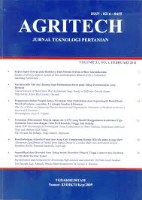
Agritech
Empowering Agricultural Progress with Open Access ResearchAgritech is a prominent open-access journal dedicated to advancing the field of agricultural technology. Published by UNIV GADJAH MADA, FAC AGRICULTURAL TECHNOLOGY, this esteemed journal disseminates innovative research and cutting-edge practices that contribute significantly to sustainable agriculture, precision farming, and environmental stewardship. Launched in 1999, Agritech has established itself as a vital resource for researchers, professionals, and students alike, providing a platform for the exchange of ideas and findings that shape the future of agricultural technology. By embracing an open-access model, the journal ensures that high-quality research is accessible to a global audience, promoting collaboration and knowledge sharing in the agricultural community. With an ISSN of 0216-0455 and an E-ISSN of 2527-3825, Agritech remains committed to enriching agricultural practices and policies through rigorous scientific inquiry and innovation.

TROPICAL AGRICULTURE
Fostering regional advancements in tropical farming.Tropical Agriculture is a reputable journal dedicated to advancing knowledge and research in the fields of Agronomy and Development, with a particular emphasis on tropical farming practices and agricultural innovation. Published by the University of the West Indies, this journal serves as a crucial resource for researchers, professionals, and students engaged in the complexities of agriculture in the tropics. Established in 1979, it has witnessed significant contributions and continues to facilitate scholarly discussions through its quarterly publications. While the journal currently holds a Q4 ranking in both the Agronomy and Development categories, its commitment to fostering research excellence positions it as a pivotal platform for emerging studies and regional agricultural advancements. Although not an open-access publication, it provides critical insights and localized research that greatly benefit the agricultural community, particularly within the Caribbean context. Researchers and professionals in the field can rely on this journal for insightful content on tropical agricultural challenges and developments, enhancing knowledge dissemination and application across related disciplines.

Studies in Agricultural Economics
Elevating Agricultural Economics through Open AccessStudies in Agricultural Economics is a premier journal published by AGRARGAZDASAGI KUTATO & INFORMATIKAI INTEZET in Hungary, focusing on innovative research in the interdisciplinary fields of agricultural, biological, and economic sciences. Since becoming an Open Access journal in 1997, it has aimed to enhance the visibility of agricultural economics scholarship while promoting global engagement among researchers, practitioners, and policymakers. With its robust Q2 and Q3 rankings across varied categories including Development and Geography, this journal serves as a significant platform for disseminating cutting-edge studies that address crucial issues in agriculture and rural development. The journal's continuous publication since 2011 until 2024 exemplifies its commitment to providing timely insights into evolving agricultural challenges. With a strong Scopus ranking across multiple domains, particularly in the social sciences and agricultural sectors, it stands as a vital resource for anyone looking to advance knowledge and practice in these critical areas.